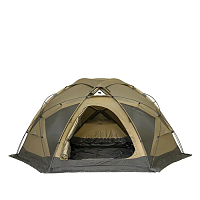Cart
Off-Grid Living: How Yurts Offer Independence and Freedom
In a world where sustainability and self-sufficiency are increasingly valued, off-grid living has become a desirable lifestyle choice for many. And when it comes to embracing this independent way of life, yurts have emerged as an ideal option. These portable, circular structures offer a unique blend of simplicity, functionality, and eco-friendliness that allows individuals to live off-grid with freedom and independence. In this detailed blog post, we will explore how yurts provide the perfect platform for off-grid living, empowering individuals to embrace a more sustainable and self-reliant lifestyle.
Section 1: The Appeal of Off-Grid Living
Off-grid living allows individuals to reduce their ecological footprint by minimizing reliance on public utilities. By adopting sustainable practices such as harvesting rainwater, utilizing solar power, and embracing composting toilets, people can live in harmony with the environment.
Section 2: The Advantages of Yurts for Off-Grid Living
Yurts are typically constructed using eco-friendly materials such as natural fabrics, sustainable wood, and low-impact adhesives. These materials not only minimize the environmental impact but also create a healthier living environment free from toxic chemicals.
Section 3: Off-Grid Essentials for Yurt Living
Composting toilets are an excellent choice for off-grid yurt living. These systems convert human waste into nutrient-rich compost, eliminating the need for traditional sewage systems. Additionally, recycling and responsible waste disposal methods should be employed to minimize environmental impact.
Section 4: The Challenges and Solutions of Off-Grid Yurt Living
Efficient water usage and energy conservation are crucial for off-grid living. Implementing water-saving practices, installing energy-efficient appliances, and being mindful of power consumption can help ensure a sustainable and self-sufficient lifestyle.
Section 5: The Freedom of Off-Grid Yurt Living
Living off-grid in a yurt encourages a simpler way of life, focusing on the essentials rather than material possessions. This shift towards minimalism allows individuals to prioritize experiences, personal growth, and meaningful connections.
Conclusion:
- Contact Us
-

About Pomoly
Pomoly is a leading camping brand specializing in hot tents and tent stoves. We are camping life explorer, Follow Page / Join Group, let's make camping enjoyful together!
Working Hours
Mon-Fri, 09:00 - 17:00

- Company Info
- NEWS
- About us
- Pomoly Name
- Leave-No-Trace
- Contact Now
- Facebook Group
- YouTube Learning
- Contact Us
- Topic Collections
- Policies & Terms
- Payment Policy
- Shipping Policy
- Return & Refund
- Privacy Policy
- Terms of Use
- Tax Policy
- Website Disclaimer
- Safety Disclaimer
- Warranty Policy
- Promotion Policy
- Pre-order Policy
- INTELLECTUAL PROPERTY RIGHTS
- Dealers Agreement And Terms
- Become Affiliate
- User Center
- Forget Password
- My Orders
- Tracking Order
- My Account
- Register
- Popular Searches
-
Tipi Tents Dome Tents Camping Tent Hammock Stove Camping Camping Pellet Stove Circle 6 Titanium Water TankDome X Locomotive 20 LEO 2 camping tent T-Brick 2.0 T1 2.0 tent stove Dweller wood stove Oroqen 2.0 Chimney Water Tank Lumberjack STOVEHUT Bromance 70 Tipi Pomoly Coupon Baker Oven Stove Titanium elbow Fire Pits Tent Stove titanium Stove Outdoor Pellet Stove
keebon pellet stove






